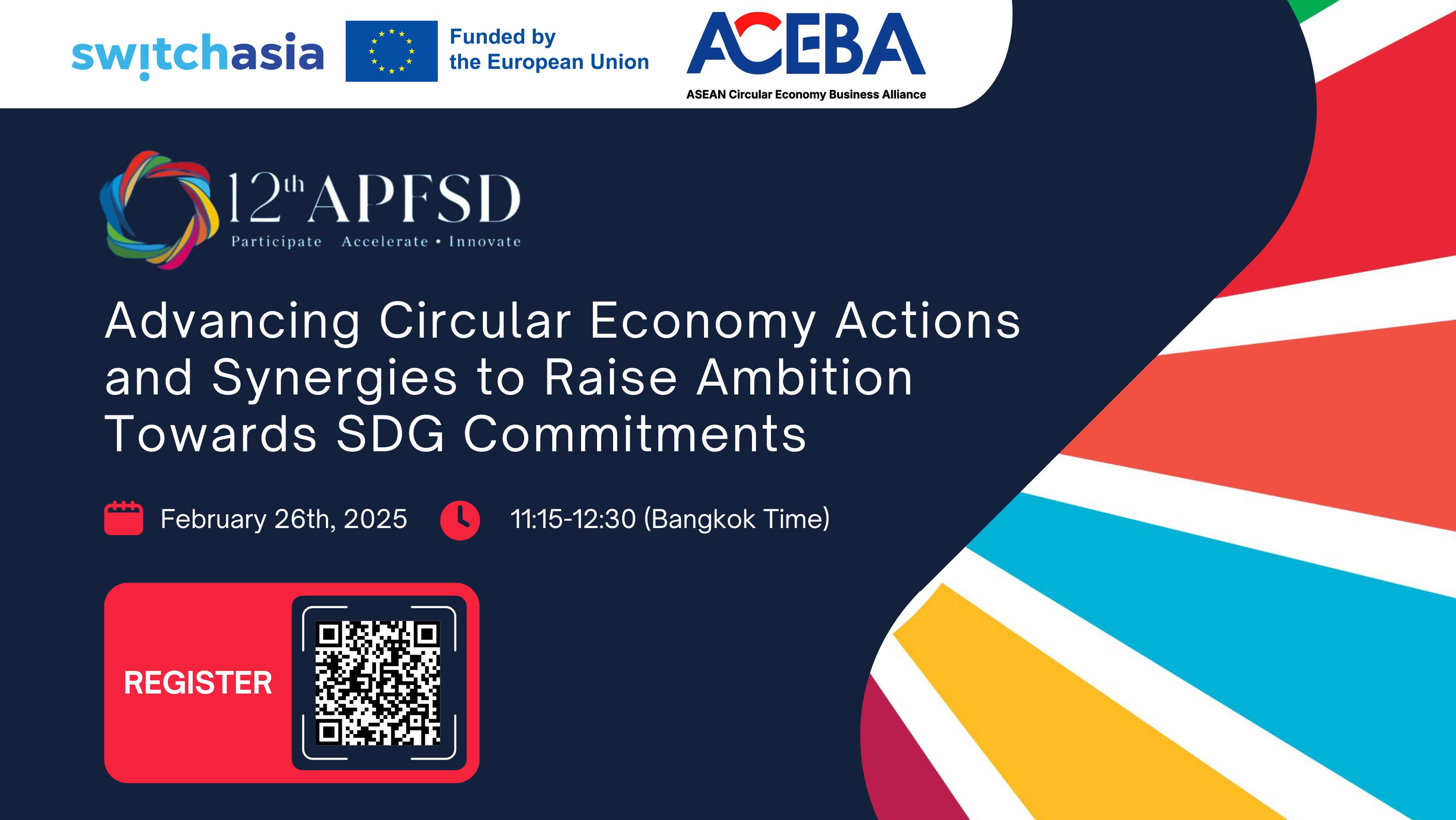
Co-organizers: ASEAN Circular Economy Business Alliance; ARAIBA Sdn Bhd, and EU Delegation to Thailand
WHEN: 26 February 2025 I TIME: 11:15-12:30 (Bangkok Time) I Watch the Recording HERE I Official Event Page
Background:
The Asia-Pacific Forum on Sustainable Development (APFSD) is an annual, inclusive intergovernmental forum to support follow-up and review of progress on the 2030 Agenda for Sustainable Development and the Sustainable Development Goals (SDGs) at the regional level. This regional platform aims to inform, empower, and support Asia-Pacific countries (especially least developed countries, landlocked developing countries and small island developing States) in their efforts to achieve the 17 Sustainable Development Goals and their targets set out by the 2030 Agenda by identifying regional trends and sharing best practices and lessons learned. The Forum convenes United Nations system bodies, member States, international organisations, civil society, and other stakeholders whose reflections feed into and inform the 2025 High-level Political Forum (HLPF) in New York, which reviews sustainable development progress at the global level.
The 12th APFSD will be organized from 25 to 28 February 2025 under the theme: “Advancing sustainable, inclusive, science- and evidence-based solutions for the 2030 Agenda and its SDGs for leaving no one behind in Asia and the Pacific” at the United Nations Conference Center (UNCC) in Bangkok, Thailand.
In alignment with the focus of the 2025 HLPF, the Forum will assess progress on the SDGs under review: Goal 3 (good health and well-being); 5 (gender equality); 8 (decent work and economic growth); 14 (life below water) and 17 (partnership for the Goals). The Forum will provide a platform and sessions to support countries presenting their voluntary national reviews at the 2025 HLPF.
Side Event:
The transition to circular economy in Southeast Asia has gained momentum providing new impetus for the economy, climate action and creation of fair and decent jobs and skills development. It also provides further benefits towards sustainable cities, clean water and health as well as spurring sustainable consumption and production (SCP) – indeed synergizing benefits across the broad SDG agenda. Moreover, forward looking, innovative businesses and other organisations have started to adopt circular economy practices and techniques, which in turn are catalysing business action towards the regional circular economy transition in Southeast Asia. The event will bring together policy makers and stakeholders to discuss the importance of aligning circular economy closely with Sustainable Development Goals (SDG) 8, which emphasizes fostering inclusive, sustainable economic growth, employment, and decent work for all, SDG9 on innovation and SDG12 on sustainable consumption and production. Circularity concept and best practices are to be embedded in economic systems, governments, businesses, and communities to create a resilient, resource-efficient economy.
This side event will also discuss the scope, benefits, and experiences of mobilising and fostering collaboration through business leadership and action on circular economy in Southeast Asia and on how this could contribute to meeting commitments of the SDGs, particularly SDG 12, 8, 9 and 17 addressing the current triple planetary crisis.
Key questions:
- How can Circular Economy (CE) actions support the sustainability ambitions in Southeast Asia?
- How can CE policies and practices contribute to implementing SDGs 8, 9, 12, and 17, and their targets, specifically in fostering inclusive, sustainable economic growth, employment, and decent work for all?
- How can regional and national CE policies contribute to supporting businesses, mainly Micro, Small and Medium Enterprises (MSMEs), towards resilient, resource efficient, circular economies in the sub region?
- What are the experiences in Southeast Asia in mobilising and fostering collaboration through business leadership and action on circular economy and on how is this contributing to the commitments of the SDGs, particularly SDG 12, 8, 9, and 17?
Outcomes
-
- Increased awareness on role the importance of business leadership and action on circular economy as an essential tool for advancing the SDGs.
- Strengthened policy alignment of SDG 13 and 17 with SCP and CE strategies
This side event will discuss how to support the implementation of SDG 12, 8, 9 and 17 through partnerships with the business community. The key presentation will be delivered, addressing the intertwined issues of CE and its diverse contributions to advancing the SDGs. The panel discussion will build on the key presentation and discuss the challenges and opportunities to integrate circular economy strategies and practices. The recommendations from the event will inform possible interventions needed to support national governments and regional organisations in the ASEAN region on the uptake of SCP and CE approaches towards low-carbon, resource-efficient and circular economy.
Hosts
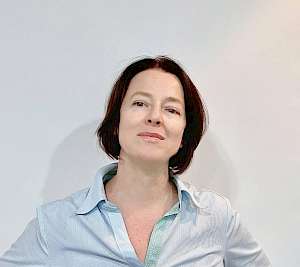
Zinaida FADEEVA, Team Leader, SWITCH-Asia Policy Support Component
Zinaida Fadeeva is the Team Leader of the Policy Support Component of the SWITCH-Asia Programme. Zinaida has over 25 years leading international professional experience in policy for and practice of sustainable consumption and production (SCP) and Education for Sustainable Development, amongst others working with the United Nations University Institute for the Advanced Studies of Sustainability (UNU-IAS). Her work has focused on diverse topics such as tourism, plastics, construction, small and medium enterprises, procurement and lifestyle. Zinaida has worked extensively with governments, private sector, international organisations and academia in East, South East, South and Central Asia.
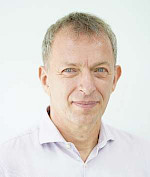 Rene VAN BERKEL, Co-convenor of ACEBA; Senior Expert for SWITCH-Asia Policy Support Component and Thammasat University
Rene VAN BERKEL, Co-convenor of ACEBA; Senior Expert for SWITCH-Asia Policy Support Component and Thammasat University
Dr René Van Berkel was formerly the Representative and Head of the Regional Office of the United Nations Industrial Development Organization (UNIDO) in India. In this role he was responsible for industry and government advocacy and coordination of UNIDO technical assistance portfolio on inclusive and sustainable industrial development, covering energy and resource efficiency, renewable energy, innovation, digitalization and circularity and MSME development. Previously he served amongst others in thematic leadership roles on resource efficient and cleaner production in UNIDO and as Professor of Cleaner Production at Curtin University of Technology in Australia. René has a three decade track record of pioneering and implementing SCP techniques, practices and policies in manufacturing and other productive sectors in Asia (including India, Indonesia, China, Viet Nam, Bangladesh and Myanmar) and globally. He currently serves as Senior Circular Economy Expert for the EU SWITCH-Asia Policy Support Component.
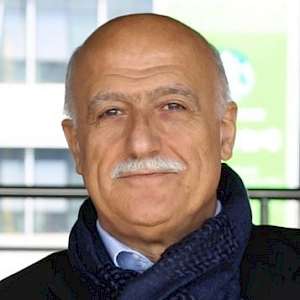
Arab HOBALLAH, SCP Senior Expert for the Pacific, SWITCH-Asia Policy Support Component and Executive Director, SEED
Arab Hoballah serves, since August 2021, as Executive Director, SEED-Entrepreneurship for Sustainable Development, aimed at providing tailored support to eco-inclusive MSMEs with adequate policy frameworks, as key contribution to the transition to green and circular economy, through resource efficiency and SCP. He is also currently a SCP Senior Expert for the Pacific at the EU SWITCH-Asia Policy Support Component. From 2005 to 2016, Arab was Chief of Sustainable Consumption and Production/SCP in UNEP, where he looked for mainstreaming Resource Efficiency and SCP policies at local, national, regional and global levels, through various sectors, various tools and methodologies and relevant partnerships in close cooperation with governments, business and industry, civil society. A major outcome of this work is the 10YFP, the 10 Year Framework of Programmes on SCP, adopted at Rio+20.
Speakers
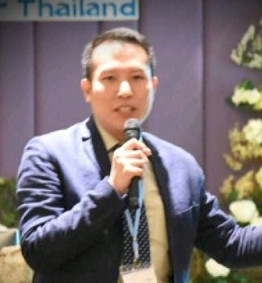
Dr. Saroj SRISAI, Programme Officer (Cooperation Section), EU Delegation to Thailand
Dr. Saroj Srisai is the Programme Officer at the Cooperation on Climate and Sustainable Development Division at the Delegation of the European Union to Thailand since 2021. He is the programme manager for Thailand and Malaysia for the EU SWITCH-Asia Programme. He was the Head of the Environmental Division at the ASEAN Secretariat from 2014 to 2017. He previously worked as a technical expert in USAID, UN FAO, and the ASEAN Coordinating Centre for Humanitarian Assistance on disaster management (AHA Centre). He finished his Msc on Engineering, Energy and Resources at the University of California, Bekely and his Executive Master on Diplomacy and International Strategy in the London School of Economics and Political Science (LSE).
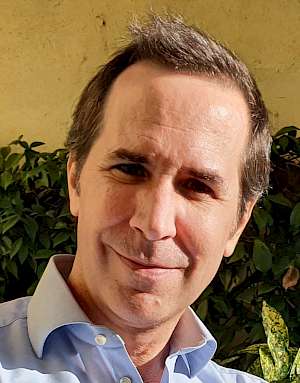 Carlo Figà TALAMANCA, Founder & Director of Khmer Green Charcoal Co., Ltd. (KGC)
Carlo Figà TALAMANCA, Founder & Director of Khmer Green Charcoal Co., Ltd. (KGC)
Carlo Figà Talamanca is an entrepreneur and sustainability expert with over 20 years of experience in circular economy, renewable energy and impact-driven business models. In 2012 he founded Khmer Green Charcoal (KGC), a pioneering enterprise in Cambodia that transforms agricultural waste into sustainable char-briquettes. KGC has since grown into a market leader in Cambodia and in the region, attracting investment and exporting internationally. In 2024, he successfully transitioned KGC to new ownership by selling a majority stake to a Cambodian conglomerate, ensuring its continued growth and impact under local leadership. Today, KGC remains a recognized case study in circular economy, demonstrating how sustainable business models can drive both environmental and economic transformation. With a background in industrial engineering, Carlo began his career in Europe and the USA, working on technology transfer projects and venture capital investments. He later shifted his focus to renewable energy and sustainable business in developing countries, leading initiatives across Asia and Africa. Carlo is passionate about transforming sustainability challenges into business opportunities. He believes real impact comes from solutions that are both scalable and economically viable, a vision he continues to pursue through KGC and beyond.
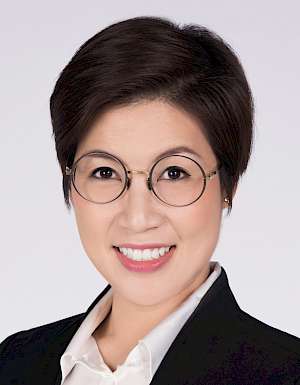
Ms. Thanya KRICHTITAYAWUTH, Executive Director, UN Global Compact Network Thailand Global Compact Network Thailand
Thanyaporn Krichtitayawuth (Thanya) is a professional in volunteer management and positive psychology (PhD.), recognized with the Management Women Award by Thailand’s Prime Minister, Prayuth Chan-Ocha, in 2020(GDRI, The Gender and Development Research Institute). She was invited to contribute to building a sustainable economy, society, and environment as the Executive Director of the Global Compact Network Thailand (GCNT), a part of the UN Global Compact initiative working toward the 17 Sustainable Development Goals (SDGs) by 2030. GCNT facilitates sustainability efforts through strategic processes and assessment tools, helping businesses integrate long-term sustainability into their operations, regardless of industry, competition, or business context. Thanya brings 24 years of experience in corporate compliance, engineering, and supply chain management from Johnson & Johnsonand Procter & Gamble, where she led strategic initiatives in automation, e-manufacturing, and data analytics. Her leadership in corporate governance earned her the Prestige-level FDA Quality Award in 2017, 2018, and 2019 as a site compliance director.
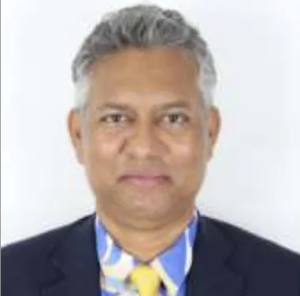 MR. Sudip Ranjan BASU, Chief of ESCAP Sustainable Business Network (ESBN) Section
MR. Sudip Ranjan BASU, Chief of ESCAP Sustainable Business Network (ESBN) Section
MR. Sudip Ranjan BASU is an economist with over 23 years of professional experience in the United Nations system. Currently, he is serving as the Chief of Sustainable Business Network in Trade, Investment, and Innovation Division of ESCAP. Sudip recently completed a successful three-year tenure at the ESCAP Subregional Office for the Pacific in Suva. His previous roles include serving as the Special Assistant to the Under-Secretary-General and the Executive Secretary of ESCAP, and as an Economist and Acting Chief of the Countries with Special Needs Section in the Macroeconomic Policy and Financing for Development Division in Bangkok. Prior to joining UNESCAP, Sudip worked at the United Nations Conference on Trade and Development (UNCTAD) from 2004 to 2011 and served as a consultant for the International Labour Organisation (ILO) in Geneva and the World Bank. Sudip holds a Ph.D. in International Economics from the Geneva Graduate Institute, along with an M.A. and M.Phil. in International Trade and Development from Jawaharlal Nehru University in New Delhi. He completed his undergraduate studies in Economics (Honors) at the University of Calcutta.
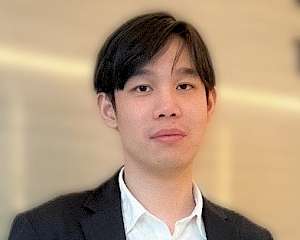 Mr. Suttanai LAOSAMATHIKUL, Sustainable Development Specialist, Fortune Parts Industry PCL Thailand
Mr. Suttanai LAOSAMATHIKUL, Sustainable Development Specialist, Fortune Parts Industry PCL Thailand
Mr. Suttanai LAOSAMATHIKUL is the Sustainable Development Specialist at Fortune Parts Industry Public Company Limited Thailand. His expertise focuses in supporting businesses on sustainability issues and ESG, in particular, has interest on sustainable materials, environmental governance and sustainable reporting. He finished his Master of Engineering (Engineering Technology) in Sustainable Energy and Resources Engineering at Sirindhorn International Institute of Technology (SIIT), Thammasat university.
Agenda
|
Speakers/Discussants |
Presentations/Discussions |
Time |
|
Session Moderator: Mr. Arab HOBALLAH, SCP Senior Expert for the Pacific, SWITCH-Asia Policy Support Component and Executive Director, SEED |
Background and Introduction of the side event. |
2 min |
|
Mr. Saroj SRISAI, Programme Officer (Cooperation Section), EU Delegation to Thailand |
Welcome Remarks: EU’s commitment to supporting Southeast Asia in the transition to a low-carbon, resource-efficient and circular economy |
7 min
|
|
Mr Sudip Ranjan BASU, Chief of ESCAP Sustainable Business Network (ESBN) Section |
Presentation on Accelerating business commitments towards circular economy to achieve the SDGs |
8 min |
|
Dr. Rene VAN BERKEL, Co-convenor of ACEBA; senior expert of SWITCH ASIA PSC and Thammasat University |
Presentation on Circular Economy as pathway towards ambitious SCP and climate action and opportunities this presents to business |
12 min |
|
Panel Discussion Moderator of Panel Discussion: Mr. Thomas THOMAS, Co-convenor ACEBA; Chairman, ARAIBA Sdn Bhd; and senior expert of SWITCH-Asia PSC Panelists:
|
30 min |
|
|
Open Discussion (Moderated by Mr. Arab Hoballah) |
8 min |
|
|
Dr. Zinaida FADEEVA, Team Leader, EU SWITCH-Asia Policy Support Component |
Closing remarks |
8 min |


